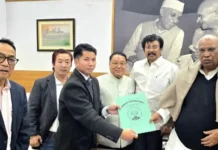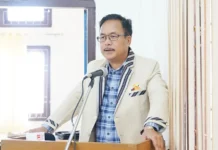[ Nyatum Doke ]
‘Awareness generation’ – an apparently easy and ultimate solution to most of the issues, the term has become so clichéd that it sometimes feels like an escape mechanism – print some banners, posters, some meetings, some slogans, and the work is done. Awareness is generated, and if not, it’s the fault of the targeted populace.
Despite so much effort of the state government to fight the menace of drug addiction and drug trafficking, still the rate is high and, in all probability, increasing. Once we had a meeting in our district, Longding, on the issue of drug abuse. Many stakeholders shared grim scenarios of drug abuse in the district. One of the main solutions the house came up with was ‘awareness generation’. Everyone sounded like an expert, but no one bothered about how to do it.
Awareness is not something that can be injected in a single shot into the bloodstream; it is a long, extensive process, dealing with behavioural and attitudinal changes, which will require persistent approach, conviction and persuasions at different levels by different groups of actors. Coming back to awareness generation against drug abuse, the first pertinent question is, whom to make aware and how?
Most importantly, the first candidates to be made aware should be the implementing agencies and other officials. They need to be made aware of the various nuances of the existing rules and provisions. When it comes to creating awareness among the public, there is big ‘how to?’, because the process is not linear or a single-phased one. It should be multilayered, with different stratified levels of programmes, showcasing both ‘carrots and the sticks’. For example, there needs to be different approaches for different stakeholders – one who is not yet addicted, one who is addicted, and one who has completed the de-addiction course. Therefore, the efforts need to be very nuanced and calculated.
Audiovisual materials in local languages, like cartoons and documentaries, may be created with regard to the ‘stick’ side of the policy. These materials should deal with all the penal provisions and laws in a simplified manner to create a sense of deterrence, as it is important that common people understand the laws and the penal provisions related to drug abuse.
It is often said that there is scope for providing alternative livelihood options to farmers traditionally growing and dependent on opium cultivation, under the provisions of the laws. These provisions should be the mainstream of the awareness programmes. An example of successful rehabilitation needs to be showcased on a pilot basis, as we all know that actions speak louder than words. In places where people are traditionally dependent on opium cultivation, the people will ask for something in return before giving up their traditional occupation. So, if an alternative is chalked out beforehand, it would go a long way.
The recent order issued by the government of Arunachal Pradesh was indeed in a good direction, providing a timeline for disclosing one’s de-addiction course or facing penal action. However, the most important part is to draw a proper strategy to create public awareness about the menace. Drug addicts don’t read newspapers or articles. They don’t have the time to read banners. From my own experiences, I can say that people seldom understand the purpose of the announcements through long microphones or pompous rallies. Saying so, I am not denying the importance of such activities; they are indeed vital if strategically planned and utilized.
The underlying problem with the efforts of awareness generation and IEC activities in any field by the government is that, there is no particular centre or department working on the same. I think the department of information & public relations could do a wonderful job if the planning or execution of awareness and IEC activities of even other departments is routed through it. This was supposed to be one of its important mandates, I am sure. Then again, it has its own share of issues, which will need another article to be enumerated.
By saying so, I am by no means trying to demean the efforts of anyone. What I am trying to say is that, there is a need to streamline our approach. Though ‘awareness generation’ and ‘IEC activities’ sound like easy lexical terms, they are much more than just some clichéd words – they involve strategic planning, based on scientific, psychological and empirical evidence and observation. Let’s understand and be aware of this fact, then herald a change together! (Nyatum Doke is DIPRO, Longding)



